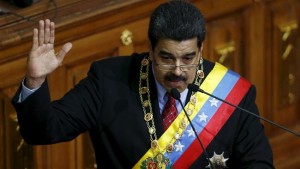Economic Emergency Powers Granted to President of Venezuela
 Venezuelan President Nicolas Maduro, successor to long-time socialist leader Hugo Chavez, has claimed a special 60 day set of emergency powers over the Venezuelan economy. The South American country has recently been struggling with a set of economic circumstances that threaten to severely damage its financial output.
Venezuelan President Nicolas Maduro, successor to long-time socialist leader Hugo Chavez, has claimed a special 60 day set of emergency powers over the Venezuelan economy. The South American country has recently been struggling with a set of economic circumstances that threaten to severely damage its financial output.
While Mr. Maduro had already claimed the emergency powers for himself, the act was challenged by the new Venezuelan legislature, which was recently changed by election to leadership by an opposition party. On Friday, however, the Venezuelan Supreme Court, which critics have accused of being biased in favor of Mr. Maduro, confirmed that the president did not require legislative approval for his actions, provided that they do not extend beyond the 60 day period during which this increased authority over the economy is permitted.
The new powers that Mr. Maduro has claimed for himself give him full power over all government funds in Venezuela and the ability to allocate them for various spending initiatives at his discretion. They also extend to product markets, allowing him to set import and export quotas, as well as quotas for manufacturing and production for Venezuelan companies. Many in opposition to Maduro’s United Socialist Party have sharply criticized the overt seizure of near-total control of the country’s economy, saying that it bypasses the legislature and may briefly turn the country into a command economy.
Venezuela has seen more than its share of economic difficulties in recent months. The socialist country, already deeply in debt and widely considered to be overspending, saw its commodity-based economy contract when oil prices plummeted in the second half of 2015. The already weak economy coupled with the collapse of the country’s oil industry, by far its largest, has caused inflation to reach critical levels, with some analysts suggesting rates as high as 720 percent in the coming year. This inflation has been compounded by the tight control of currency exchange rates within Venezuela by its own government, even as its currency, the bolivar, has steadily collapsed in value. In a desperate attempt to handle the out of control inflation, the government recently began printing huge amounts of new currency notes, a move which is expected to backfire and send the value of the bolivar even farther downward. The quantities of new notes produced were so great that the government of Venezuela was forced to contract out printing to other countries, as its presses were incapable of handling the volume.
As the new presidential powers take effect, Mr. Maduro has indicated that he has a set of measures that he plans to institute that would not have been possible without them. However, he has given no specific details of his plans to the public at large, prompting many to characterize the move as an attempt to grab power away from the country’s legislature. Meanwhile, opposition leaders have vowed to redouble their efforts to remove Maduro from office this year and institute reforms that would guide the country toward a more capitalistic economic system.